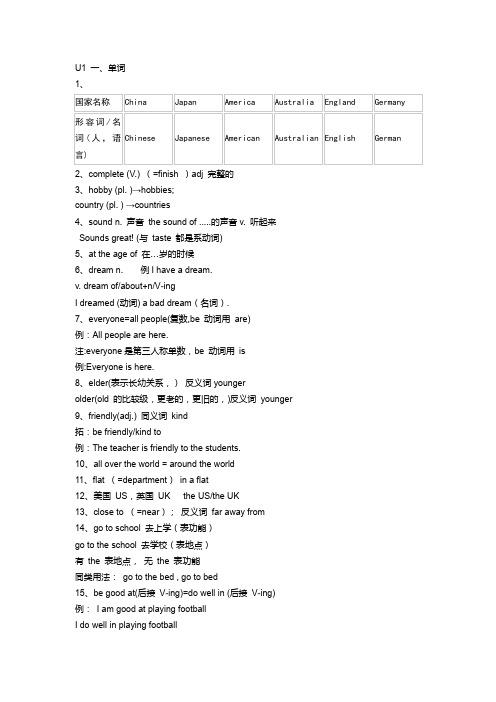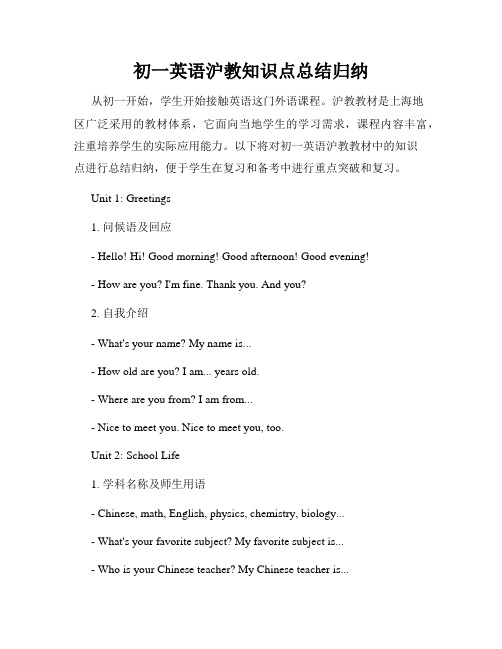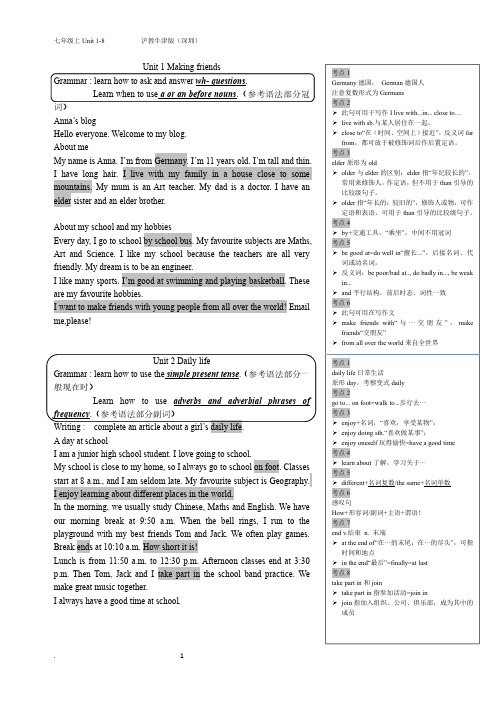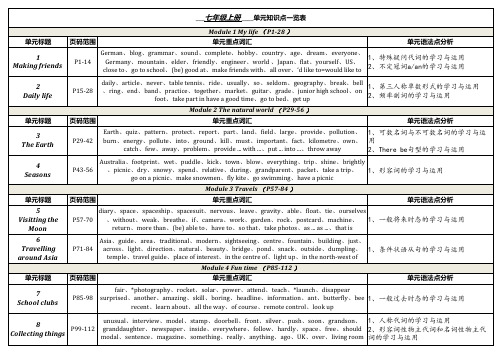沪教版七年级上英语各单元课文重点归纳
+Unit1重点知识复习讲义 沪教版(2024)英语七年级上册

U1 一、单词1、国家名称China Japan America Australia England Germany 形容词/名词(人,语Chinese Japanese American Australian English German 言)2、complete (V.) (=finish )adj 完整的3、hobby (pl. )→hobbies;country (pl. ) →countries4、sound n. 声音the sound of .....的声音v. 听起来Sounds great! (与taste 都是系动词)5、at the age of 在…岁的时候6、dream n. 例I have a dream.v. dream of/about+n/V-ingI dreamed (动词) a bad dream(名词).7、everyone=all people(复数,be 动词用are)例:All people are here.注:everyone是第三人称单数,be 动词用is例:Everyone is here.8、elder(表示长幼关系,)反义词youngerolder(old 的比较级,更老的,更旧的,)反义词younger9、friendly(adj.) 同义词kind拓:be friendly/kind to例:The teacher is friendly to the students.10、all over the world = around the world11、flat (=department)in a flat12、美国US,英国UK the US/the UK13、close to (=near);反义词far away from14、go to school 去上学(表功能)go to the school 去学校(表地点)有the 表地点,无the 表功能同类用法:go to the bed , go to bed15、be good at(后接V-ing)=do well in (后接V-ing)例:I am good at playing footballI do well in playing football二、课文部分1、welcome to +地点2、come from=be from 来自3、live in 居住在;live with 与.....一起生活4、close to=near (介词短语做house 的定语)反义词:far away from5、by school bus=take the school busby bus =take a/the bus6、favorite=like…best7、subject 复数subjects8、to be 成为9、many+可数名词复数;much 修饰不可数名词;lots of 即可修饰可数名词复数,又可修饰不可数名词10、be good at doing sth.=do well in doing sth.11、would like to do sth =want to do sth12、make friends with 交朋友13、all over=around14. young people 年轻人三、其他短语in one’s free time在某人空闲的时间answer to 回答like to do /like doing 喜欢做…… love to do / love doing sth 热爱做……enjoy + doing sht 喜欢做…… need to do 需要做……pay attention to 注意listen to 听 a boy called Bruce 一个叫Bruce 的男孩on the Internet 在网上lots of = a lot of 许多fly kites 放风筝Play volleyball 打排球hope to do sth 希望做某事hear from sb 收到某人的来信best wishes 最美好的祝愿四、语法1、特殊疑问词(7W+1H)(1)对“谁”提问用who (2)对“事件”、“物体”、“职业”提问用what(3)对“时间”提问用when/what time (4)对“地点”提问用where(5)对“谁的”提问用whose (6)对“原因”提问用why(7)对“哪一个”提问用which (8)对“交通方式”、“问好”提问用how相关短语提问:班级:what class 颜色what color 几点what time星期what day 日期what’s the date年龄:how old 多少how many/how much 价格:how much多高how tall 多重how heavy 多久how long 多远how far2、冠词(1)定冠词the(2)不定冠词a/an a + 辅音音素开头的单词an+元音音素开头的单词元音音素开头的单词有:apple,orange,egg,eraser,elephant,old,actor,engineer,English,elderbrother,art, hour,umbrella26 个英文字母前用an 的有:a,e,i,o,f,h,l,m,n,r,s,x例:There is “s” in the word of “else”.3、反身代词 yourself代词:(1)人称代词:I,you,he,she,it,we,they(2) 物主代词:my, your, his, her, its, our, theirmine, yours, his , hers, its, ours, theirs(2)指示代词:this,that,these,those(3)反身代词:yourself4、Anna's(名词所有格形式)名词所有格的变化规则:(1)通常在词尾+’s; Mother's Day(2)以s 结尾的+’;Teachers' Day(3)表示共有时,只在最后一个名词的词尾加’s,(4) 各自所有时,则分别在每个名词词尾加’s.。
沪教版初中英语七年级上册知识点

Unit 1知识梳理Unit 2知识梳理Unit 3知识梳理重点词组1.on Earth 在地球上2.stop doing 停止做某事3.provide...with... 为……提供……4.put...into... 把……倒入……5.throw away 扔掉6.lift...up 将……抬起7.keep...alive 让……活着重点句型:1.there be (is/are)….2. some are…and some are….3. it is + adj + for sb + to do …4. make/keep + adj可数vs 不可数名词可数名词:集体名词如:people,单复数同形名词如:sheep、fish、deer等常考不可数名词:music, news, paper, advice, information, weather可数、不可数名词的数量修饰:some, many / much, a lot of, a few / little , few / little 等There be 句型There is + 单数可数名词/不可数名词There are + 复数可数名词“就近原则”原则:动词be的形式要和最靠近它的主语在数上保持一致;另外,还必须注意不可数名词用作主语时,动词be应用单数形式。
例:There is a book and some pens on the desk拓展:there be(某地有某物)与have/has(某人有…) 的用法区别“There be…”句式和have均可表示“有”的意思,但用法有别。
“There be…”表示“在某处有……”,意为“存在有”;而have却表示“某人/某物有……”,意为“某人/某物拥有……”。
Unit 4知识梳理Unit 5知识梳理Unit 6知识梳理。
沪教牛津版英语七年级上册单元知识点一览表

address、(be) famous for、department store、prefer to、go on holiday、go sightseeing
1、情态动词can,may,must的学习与运用
单元标题
页码范围
Module 4 Colourful life ( P87-116 ) 单元重点词汇
单元语法点分析
7 Poems
P87-102
poem、ordinary、feeling、order、advice、aloud、group、agree、disagree、*rhyme、 complete、well、shower、*site、narrow、height、superman、seller、smile、rush、 1、祈使句和感叹句的学习和运用
person、cheerful、hard-working、patient、smart、probably、forget、smell、care、 miss、joke、laugh、remain、strict、encourage、support、successful、member as well、take care of、make fun of、(be) strict about、give up、go to work
1、量词词组的学习与运用 2、How much和How many的学习与运用
6 Electricity
P71-86
最新七年级英语上册知识点(上海教育出版社版本)

七年级英语上册知识点(上海教育出版社版本)七年级英语上册(上海教育出版社版本)Unit 1 Making friends词组listen to music 听音乐 play basketball 打篮球 read books 读书be from=come from 来自… live in 住在… live with 跟…一起住close to 接近 go to school 上学 be good at +v-ing 擅长make friends with 交朋友 all over the world 全世界be far away from 离…很远 want to 想要 would like to 愿意draw pictures=paint pictures 画画 pay attention to 注意 start with 以…开始take a bath 洗澡 on the Internet 上网 lots of 很多in free times 在空闲的时间 best wishes 最美好的祝福句型What does...mean?—It means... …是什么意思?——它的意思是…How do you go to school? ——I go to school by bus/car /on foot.你怎么去上学的?——我坐公交车/汽车 /步行上学My dream is to be a/an+职业 =I want to be a/an+职业我的梦想是成为…What’s your favourite subject?=What subjects do you like best? 你最喜欢哪一科?What does your father/mother do?=What is your father/mother? 你爸妈做什么工作?Unit 2 Daily life词组junior high school 初级中学 on foot 步行 take part in=join in 参加have a good time=enjoy oneself 过得愉快 go to bed/sleep 睡觉talk about 谈论 brush teeth 刷牙 watch TV 看电视ride a bicycle/bike 骑单车 play the piano 弹钢琴 wash clothes 洗衣服in the morning 在早上 have break 休息 from...to...从…到…at night=in the evening 在晚上 at school 在学校 get up 起床senior high school 高级中学 have breakfast/lunch/supper/dinner 吃早/午/晚/正餐keep a dairy 写日记 think of 考虑 do morning exercises 做早操句型How+形容词+主语+be动词!多么…!例:How short it is!When the bell rings, ... 铃声响起的时候……Is your school close to your home? ——Yes,it is./No,it isn’t.When dose the school day usually begin/start/end? ——At+时间Unit 3 The Earth词组be covered by 被…覆盖 provide...with...为…提供…put...into... 把…倒入… throw away 扔掉 on Earth 在地球上a lot of 很多... stop doing 停止正在做的事情stop to do 停止(手上做的接着去)做某事 save water 节约用水in the future 将来 in the air 在空中 lift up 升高句型There is+单数可数名词/不可数名词有……There are+可数名词复数有……It is + adj + (for sb) to do sth (对某人来说)做某事很…Unit 4 Seasons词组take a trip 去旅行 make snowmen/a snowman 堆雪人go on /have a picnic 野餐 fly kites 放风筝 go swimming 去游泳in + 季节/月份(spring/summer/March/July)at the time of 在…的这个时候 send out 发出have a lot of fun 玩得很开心 get + adj.(warm/hot/cold) 逐渐变…start to = begin to 开始…句型It is interesting/exciting to do sth. 做某事很有趣/兴奋It spends some time dong/to do sth. 做某事花费某时间—What’s the weather like in + 某地 + today? 某地今天天气如何?—It’s hot, but it will be rainy a few days later. 很热,不过过几天会下雨。
初一英语沪教知识点总结归纳

初一英语沪教知识点总结归纳从初一开始,学生开始接触英语这门外语课程。
沪教教材是上海地区广泛采用的教材体系,它面向当地学生的学习需求,课程内容丰富,注重培养学生的实际应用能力。
以下将对初一英语沪教教材中的知识点进行总结归纳,便于学生在复习和备考中进行重点突破和复习。
Unit 1: Greetings1. 问候语及回应- Hello! Hi! Good morning! Good afternoon! Good evening!- How are you? I'm fine. Thank you. And you?2. 自我介绍- What's your name? My name is...- How old are you? I am... years old.- Where are you from? I am from...- Nice to meet you. Nice to meet you, too.Unit 2: School Life1. 学科名称及师生用语- Chinese, math, English, physics, chemistry, biology...- What's your favorite subject? My favorite subject is...- Who is your Chinese teacher? My Chinese teacher is...2. 学校设施及地点介绍- Classroom, library, playground, cafeteria, school gate...- Where is the library? The library is next to the classroom.- Where is the cafeteria? The cafeteria is on the first floor.Unit 3: Hobbies1. 爱好及描述- Reading, swimming, playing basketball, dancing, singing...- What's your hobby? My hobby is reading.- Do you like playing basketball? Yes, I do.2. 时间状语- Every day, on weekends, in the morning, in the afternoon, at night...- When do you play basketball? I play basketball in the afternoon.Unit 4: Family1. 家庭成员及描述- Father, mother, brother, sister, grandfather, grandmother...- How many people are there in your family? There are four people in my family.- Is this your brother? Yes, he is.2. 家庭关系- Who is he/she? He/She is my...- Is she your sister? Yes, she is.Unit 5: Food and Drinks1. 食物及饮料名称- Apple, banana, orange, milk, juice, water...- What do you like to drink? I like to drink juice.2. 店铺及服务员对话- Can I help you? I want...- How much is it? It's...- Here you are. Thank you.Unit 6: Daily Routine1. 日常活动及时间介词- Get up, go to school, have breakfast, play games, go to bed... - What time do you get up? I get up at six o'clock.2. 现在进行时态- I am playing basketball. He is studying.Unit 7: Weather1. 天气形容词及问候用语- Sunny, cloudy, rainy, snowy, windy...- How's the weather today? It's sunny today.2. 季节- Spring, summer, autumn, winter...- What's your favorite season? My favorite season is summer.通过对初一英语沪教教材的知识点总结归纳,我们可以清晰地了解到初一英语学习的基本内容。
深圳沪教版初中英语七年级上课文+知识点

Anna’s blogHello everyone.Welcome to my blog.About meMy name is Anna.I’m from Germany.I’m 11years old.I’m tall and thin.I have long hair.I live with my family in a house close to some mountains.My mum is an Art teacher.My dad is a doctor.I have an elder sister and an elder brother.About my school and my hobbiesEvery day,I go to school by school bus.My favourite subjects are Maths,Art and Science.I like my school because the teachers are all very friendly.My dream is to be an engineer.I like many sports.I’m good at swimming and playing basketball.These are my favourite hobbies.I want to make friends with young people from all over the world!Email me,please!I am a junior high school student.I love going to school.My school is close to my home,so I always go to school on foot.Classes start at 8a.m.,and I am seldom late.My favourite subject is Geography.I enjoy learning about different places in the world.In the morning,we usually study Chinese,Maths and English.We have our morning break at 9:50a.m.When the bell rings,I run to the playground with my best friends Tom and Jack.We often play games.Break ends at 10:10a.m.How short it is!Lunch is from 11:50a.m.to 12:30p.m.Afternoon classes end at 3:30p.m.Then Tom,Jack and I take part in the school band practice.We make great music together.I always have a good time at school.and fields.Some places are very hot,and some are very cold.There are many different plants.Some are large.Some are small.All plants need light and water.There are different animals on Earth too.Some live on the land.Some fly in the sky.Some live under the water.There are also many people like you and me on Earth.The Earth provides us with air,water and food.It is our home.Today,there is a lot of pollution.We burn things to make energy.This pollutes the air.We put our rubbish into the sea and under the ground.This pollutes the Earth and kills animals and plants.We must stop doing these things.It is important for us to protect the Earth for our future.SpringIn spring,the weather starts to get warm.The wind blows gently.It often rains.Plants start to grow.Everything turns green.It is exciting to take a trip in spring.SummerThe weather is hot in summer.The sun shines brightly.Many people like to go to the beach and swim in the sea.It is nice to eat ice cream in the hot weather.AutumnIn autumn,everything changes.Leaves turn brown,red or yellow and start falling from the trees.It is nice to go on a picnic at this time of year because the weather is cool and dry.WinterWinter is often cold and snowy.Children love winter because they love to play in the snow.It is interesting to make snowmen.People usually spend time with their relatives during the Spring Festival.考点1The Earth 独一无二,要用冠词on earth 世界上on the earth 在地球上考点2此句可用于环境类写作provide sb.with sth.=provide sth.for sb.“为某人提供某物”The sun provides us with heat and light.=The sun provides heat and light for us.考点3pollution “污染”,不可数名词 pollute “污染”,动词 polluted “受污染的”,形容词/过去分词考点4put...into “把···倒入···;将···注入···”拓展:put up 提出、张贴;put off 推迟;put away 把···收起来;put down 放下,写下;put on 穿上,增加(体重);put out 扑灭,熄灭考点5stop doing sth.停止做某事stop to do sth.停下来去做另一件事考点6此句可用在写作文It is +adj.for sb.to do sth.“对于某人来说,做某事是...的”注:当形容词表示人物性格、特点时,for 要变为of 。
沪教牛津版七年级上册单元知识点一览表

1、第三人称单数形式的学习与运用 2、频率副词的学习与运用
Module 2 The natural world ( P29-56 )
页码范围
单元重点词汇
单元语法点分析
P29-42
Earth、quiz、pattern、protect、report、part、land、field、large、provide、pollution、 1、可数名词与不可数名词的学习与运
return、more than、(be) able to、have to、so that、take photos、as ... as ...、that is
Asia、guide、area、traditional、modern、sightseeing、centre、fountain、building、just、 P71-84 across、light、direction、natural、beauty、bridge、pond、snack、outside、dumpling、 1、条件状语从句的学习与运用
temple、travel guide、place of interest、in the centre of、light up、in the north-west of
Module 4 Fun time ( P85-112 )
页码范围
单元重点词汇
单元语法点分析
fair、*photography、rocket、solar、power、attend、teach、*launch、disappear P85-98 surprised、another、amazing、skill、boring、headline、information、ant、butterfly、bee 1、一般过去时态的学习与运用
沪教版七年级英语上册各单元知识点

沪教版七年级英语上册各单元知识点全文共3篇示例,供读者参考篇1Sure, here is an essay on the key points of each unit in the Shanghai Edition Grade 7 English textbook (Volume 1), written from the perspective of a student, in approximately 2000 words:Unit 1: Nice to Meet YouIn this unit, we learned how to introduce ourselves and greet others in English. The key expressions were "Nice to meet you", "My name is...", and "I'm from...". We also practiced spelling our names and saying where we're from. The dialogues helped us get familiar with common greeting phrases.Unit 2: My Favorite ThingsThis unit was all about talking about our likes and dislikes. We studied how to use phrases like "I like..." and "I don't like..." to express preferences for different foods, sports, subjects, etc. There were some fun vocabulary words related to hobbies and interests. The grammar focus was on using singular and plural nouns correctly.Here we learned to describe our daily routines and schedules. The time expressions (e.g. in the morning, at night) and sequence words (first, then, after that) were really useful. We practiced asking "What time do you...?" and answering with sample schedules. Understanding adverbs of frequency was key for this unit.Unit 4: Looking GoodAppearance and clothing were the themes of this unit. By learning adjectives to describe how people look (tall, short, etc.) and words for different items of clothing, we could say things like "He's wearing a red shirt". We also learned how to use possessive adjectives correctly. The readings gave some interesting cultural perspectives on fashion.Unit 5: Activities and InterestsThis unit combined some of the language from previous units to allow us to talk more fully about our hobbies, free-time activities, and personal interests. The key grammar points included using the simple present tense for habits/routines and giving reasons with "because". We read about different extracurricular activities students can join.The dialogues and texts in this unit were all about celebrating special occasions and events like birthdays, holidays, etc. We studied vocabulary related to celebrations as well as phrases for giving good wishes ("Have a great day!", "Congratulations!"). Using prepositional phrases to indicate dates and times was practiced.Unit 7: Animal WorldAs you can guess, this unit introduced different animals and their characteristics. We learned words for describing animals' physical features, behaviors, habitats, etc. The grammar focused on proper use of demonstrative pronouns (this, that, these, those) as well as making comparisons using "as...as". The reading gave some insights into animal intelligence.Unit 8: Going PlacesThis unit equipped us with language for talking about travel, transportation, sights to see, and tourist activities. We studied different modes of transport and phrases you need when taking a trip ("check in", "book a hotel", etc.). The use of prepositions for indicating locations was highlighted. Reading a travel brochure was one of the tasks.Overall, this textbook has provided a solid foundation in conversational English centering on practical, real-life topics that middle school students can relate to. While building our vocabulary and grammatical knowledge, we've also gained insights into different cultures and perspectives through the readings. I feel much more confident using English to communicate about my daily experiences, interests, and future plans.篇2Unit 1: Hello, New TermIn this unit, we learned how to greet people and introduce ourselves in different situations. The key grammar points covered pronoun cases (I, me, you, etc.), the verb "to be" in different tenses, and question words like "what", "who", and "where". We also studied vocabulary related to school subjects, personal interests, and hobbies.Unit 2: The Same or DifferentThis unit focused on making comparisons using comparative and superlative adjectives. We learned how to form the comparative and superlative forms of one-syllable andmulti-syllable adjectives. The grammar section also includedusing "as...as" to show equality. New vocabulary revolved around describing people's personalities, appearances, and abilities.Unit 3: A Piece of AdviceHere, we explored the use of modal verbs like "should", "must", "have to" to give advice or make suggestions. The grammar covered forming negative and interrogative sentences with modals too. We read some interesting texts that gave advice on things like managing stress and dealing with peer pressure. New words were related to mental health, peer relationships, and social issues.Unit 4: A Brighter FutureIn this unit, we learned about expressing future plans and intentions using "will", "going to", and present continuous tense. The grammar section highlighted the different usages of these future forms. We studied vocabulary related to environmental protection, natural resources, and sustainability. The reading texts discussed ways to create a more eco-friendly future.Unit 5: In Memory of the PastThis unit introduced us to narrating past events using simple past tense. We covered the rules for regular and irregular verbs, as well as forming negative and interrogative sentences in simplepast. New vocabulary revolved around describing life experiences, family history, and cultural traditions. The texts gave insights into different cultures and customs.Unit 6: Telling StoriesHere we explored story telling techniques using past continuous tense and the contrast between past simple and past continuous. Grammar focused on forming the past continuous and using it to set the scene or describe ongoing actions. Vocabulary was related to narrating stories, describing scenes, using adverbs, and adding details.Unit 7: Living and TravelingIn this unit, we learned how to make comparisons using "as...as", "not as...as", "the same as", and other structures. The grammar also covered using quantifiers like "a few", "a little", "many", "much" etc. We expanded our travel vocabulary and read texts about different holiday destinations.Unit 8: Media and CommunicationsThis unit was all about talking about abilities using"can/can't", "could/couldn't" for past abilities, and modal verbs like "may/might" to express possibility. We studied vocabulary related to media, technology, and communication methods.Texts discussed the influence of media and social skills for the digital age.Throughout the textbook, we also learned lots of useful phrases and expressions to make our English sound more natural and fluent. Overall, this textbook helped improve our reading, writing, listening, and speaking abilities while introducing key grammar concepts.篇3Sure, here's an article about the key points covered in each unit of the Shanghai Education Edition Grade 7 English textbook (Volume 1), written from a student's perspective. The article is approximately 2,000 words long and is written in English.Title: Navigating the Shanghai Education Edition Grade 7 English Textbook (Volume 1)As a seventh-grader, the Shanghai Education Edition English textbook has been our trusty companion in our journey to mastering the English language. Each unit presents a unique set of challenges and opportunities for growth, and I'm excited to share my insights into the key points covered in Volume 1.Unit 1: Hello, New Term!Diving into the first unit, we were introduced to the basics of greetings, introductions, and expressing likes and dislikes. We learned how to engage in simple conversations, asking and answering questions about our hobbies, favorite subjects, and aspirations. The unit also touched upon the importance of punctuality and being on time, a valuable lesson for our daily lives.Unit 2: My FamilyThis unit was all about family dynamics and relationships. We explored different family members' roles and responsibilities, as well as how to describe their appearances and personalities. Additionally, we learned how to express our feelings towards our family members and the importance of cherishing these bonds.Unit 3: My DayAh, the unit that taught us how to talk about our daily routines! We learned to use time expressions and sequence words to describe our activities from morning till night. From brushing our teeth to doing homework, we can now articulate our schedules with ease. The unit also introduced us to the concept of making plans and appointments, a handy skill for the future.Unit 4: My HobbyHobbies are such a fun topic, and this unit allowed us to explore different activities and interests. We learned how to express our likes and dislikes, as well as how to invite others to join in our hobbies. The unit also touched upon the importance of having a balanced lifestyle and managing our time effectively.Unit 5: My School LifeSchool life is a significant part of our lives, and this unit helped us understand how to talk about it in English. We learned how to describe our classrooms, subjects, teachers, and extracurricular activities. The unit also covered the concept of school rules and the importance of discipline in academic settings.Unit 6: My NeighborhoodExploring our neighborhoods was the focus of this unit. We learned how to describe different types of buildings, shops, and public facilities. The unit also introduced us to the concept of giving directions, a valuable skill for navigating unfamiliar areas.Unit 7: My WeekendWeekends are a time for relaxation and fun, and this unit taught us how to express our weekend plans and activities. Welearned how to discuss different forms of entertainment, such as watching movies, going to the park, or visiting friends. The unit also covered the importance of balancing work and leisure.Unit 8: My VacationAh, the unit that made us all dream of summer vacations! We learned how to talk about different vacation destinations, modes of transportation, and travel preparations. The unit also introduced us to the concept of describing experiences and sharing stories from our trips.As we progressed through Volume 1 of the Shanghai Education Edition Grade 7 English textbook, we not only expanded our vocabulary and improved our grammar, but we also gained valuable insights into different aspects of life. From family dynamics to school routines and neighborhood explorations, each unit provided us with a unique perspective and prepared us for real-world conversations and experiences.。
- 1、下载文档前请自行甄别文档内容的完整性,平台不提供额外的编辑、内容补充、找答案等附加服务。
- 2、"仅部分预览"的文档,不可在线预览部分如存在完整性等问题,可反馈申请退款(可完整预览的文档不适用该条件!)。
- 3、如文档侵犯您的权益,请联系客服反馈,我们会尽快为您处理(人工客服工作时间:9:00-18:30)。
沪教版七年级上英语各单元课文重点归纳单元一:打招呼
- 课文内容:介绍自己的名字、年龄、国籍等基本信息,并研究如何打招呼。
- 重点归纳:
- 学会用英语自我介绍:Hello, my name is [名字]. I'm [年龄] years old. I'm from [国籍].
- 学会用英语问候:Hello! / Hi! / How are you? / Nice to meet you.
- 能够恰当回答问候:I'm fine, thank you. / Nice to meet you too.
单元二:家人
- 课文内容:介绍家人的基本信息及相貌特征,并研究如何用英语表达家庭关系。
- 重点归纳:
- 学会用英语介绍家庭成员:This is my [家庭成员]. He/She is [年龄] years old. He/She has [描述性特征].
- 学会用英语表达家庭关系:father, mother, brother, sister, etc.
单元三:爱好
- 课文内容:研究如何用英语表达自己的爱好,并了解他人的爱好。
- 重点归纳:
- 学会用英语表达自己的爱好:I like [爱好]. / My hobby is [爱好].
- 学会用英语询问他人的爱好:What's your hobby? / Do you like [爱好]?
- 能够恰当回答他人的爱好:Yes, I do. / No, I don't.
单元四:学校生活
- 课文内容:介绍学校的地理位置、教学设施等,并研究如何用英语表达日常学校生活。
- 重点归纳:
- 学会用英语描述学校的位置:My school is [位置].
- 学会用英语表达教学设施:There is/are [设施] in my school.
- 学会用英语表达日常学校生活:I have [科目] on [星期]. / I study [科目] at school.
单元五:时间和日期
- 课文内容:研究如何用英语询问时间和日期,并表达个人安排。
- 重点归纳:
- 学会用英语询问时间:What time is it? / What's the time?
- 学会用英语表达时间:It's [时间].
- 学会用英语询问日期:What day is it today? / What's the date today?
- 学会用英语表达日期:It's [日期].
- 表达个人安排:I have [活动] on [日期] at [时间].
单元六:节日和庆祝
- 课文内容:研究如何用英语表达节日和庆祝活动,并了解其他国家的传统节日。
- 重点归纳:
- 学会用英语表达节日:[节日] is on [日期].
- 学会用英语表达庆祝活动:We [庆祝活动] on [节日].
- 了解其他国家的传统节日:如:Christmas, Halloween, Chinese New Year, etc.
单元七:旅行
- 课文内容:研究如何用英语表达旅行计划、目的地等,并了解一些旅游景点。
- 重点归纳:
- 学会用英语表达旅行计划:I'm going to [目的地].
- 学会用英语询问他人旅行计划:Where are you going? / Are you going to [目的地]?
- 学会用英语表达旅游景点:[景点] is a famous tourist attraction.
单元八:日常生活活动
- 课文内容:研究如何用英语表达日常生活活动,并了解一些日常用品。
- 重点归纳:
- 学会用英语表达日常生活活动:I usually [活动] on [时间].
- 学会用英语询问他人日常生活活动:What do you usually do on [时间]?
- 学会用英语表达日常用品:[日常用品] is something we use every day.
以上是沪教版七年级上英语各单元课文的重点归纳。
希望对你的学习有所帮助!。
